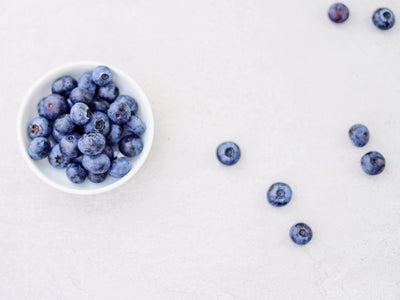The 8 supplements to take to support your immune system this winter

As a qualified nutritional therapist, Conscious Spaces founder Tara Williams is well-versed in natural ways to ward off viruses and support the immune system.
“In winter, plants lie dormant and animals hibernate,” says Tara. “It’s a time for taking things slow and being kind to your body. So anything you can do that feels supportive rather than stressful is a good idea when it comes to strengthening your defences against illness.
“Make your exercise nourishing, not punishing,” Tara advises. “Yoga, Pilates and walks in the fresh air are all great options for this time of year.
“Fill warm baths with Epsom salts and let the magnesium soak into your skin. This will help soothe your muscles, lift your mood and improve your sleep. Anything you can do to support your sleep is a good idea because sleep and immune health are so interconnected. So limit screen time to avoid blue light, and use red-toned light wherever possible to boost your melatonin levels. And keep stress levels as low as possible, because stress can have disastrous effects on the microbiome and immunity.
“I would also recommend drinking 2-3 litres of clean, filtered water every day, to flush out toxins and stay fully hydrated,” she says.
Tara proposes these actions as the ‘immune basics’ that everyone should ideally be doing as we head into winter. But, she says, as “an added first aid kit for optimum winter wellness,” and to fight off infection at the very first chance, you can up your game with the following supplements and dietary additions…
1. An all-in-one Multivitamin
As winter approaches, it’s wise to invest in a good quality multivitamin. Yes, your diet should ideally be meeting most of your nutritional needs. But thanks to intensive farming, pesticide use, industrial processing, plastic packaging and soil degradation, many of the foods on our plates are distinctly lacking in vitamins and minerals. So, once natural light wanes, exercise becomes less frequent and viruses start circulating, it’s a good idea to take a multivitamin to give your immune system some extra support.
High-quality multivitamins are more cost-effective than buying each supplement separately because you’re able to address different health needs with just one tablet. Just make sure yours contains the key immune-boosting elements: Vitamin C, Vitamin D3, selenium and zinc.
We like Seeking Health’s Optimal Health Multivitamin. Packed full of natural antioxidants like C and E, plus bioflavonoids, Q10, selenium, zinc and all the key B vitamins, it delivers both wholefoods (in the form of organic green powders such as spirulina and chlorella, as well as organic fruit and vegetable blends) and clean, pharmaceutical-grade vitamins and minerals.
“Personally, I would also take extra Vitamin D3, K2 and C alongside my multivitamin,” says Tara. “Vitamin C is absolutely vital to help your body fight off winter infections, but it’s water-soluble, meaning you use it up or wee it out rather than retaining it – so you need to keep topping up your reserves with daily supplementing."
“I always recommend taking Vitamin D3 and Vitamin K2 together,” Tara explains, “because the Vitamin K helps the body use the calcium provided by the Vitamin D more effectively. Essentially, both vitamins work better when taken with the other."
Read more about the synergistic interplay between vitamins D and K in this research paper.[1]
Read more about the benefits of Vitamin C – and how to take it for optimal results – in this article.
“By winter, we’re spending more time indoors and being exposed to increased levels of environmental toxins like mould and electromagnetic radiation. Taking an antioxidant like Glutathione will work to counterbalance some of the effects of these toxins.”
2. Glutathione and/or N-acetyl Cysteine (NAC)
Glutathione is arguably the body’s most powerful antioxidant. It’s essential for immune health, and some scientists believe it may even help extend your life span.
NAC is needed to make and replenish glutathione. For peak immune support, Tara advises alternating between the two supplements. “They help with everything from liver function to energy,” she says. “A couple of glasses of biodynamic wine can be beneficial, but coming up to Christmas, it’s easy to overdo it with alcohol, which impacts your immune system. Glutathione is the ideal supplement to help balance this out and keep your liver clean.
“By winter, we’re also all spending more time indoors and being exposed to increased levels of environmental toxins like mould and electromagnetic radiation. Taking an antioxidant like Glutathione will work to counterbalance some of the effects of these toxins.”
"Bone broth is rich in various vitamins, minerals and compounds that we need to build up our bodies through the winter months."
3. Bone broth
That steaming cauldron of bones your grandma used to stir up after a Sunday roast? A supercharged immune-boosting tool, masquerading as a simple soup.
A savoury liquid made by simmering animal bones for several hours, bone broth is rich in various vitamins, minerals and compounds that we need to build up our bodies through the winter months. These include collagen, amino acids, magnesium, calcium and glycine – which help to regulate the immune system and support the health of individual immune cells such as lymphocytes, lowering your chances of getting ill.
If you fancy making your own using an organic chicken carcass or bones supplied by your butcher, great. If you’re short on time, we can recommend Ossa’s range of organic bone broths.

4. Quercetin
Quercetin is a plant polyphenol with potent antioxidant and anti-inflammatory properties. Plus, it’s particularly good for keeping lungs healthy; working to shift anything that might be stubbornly sitting on the chest. And with respiratory viruses, coughs and colds making a resurgence at this time of year, anything that helps with lung function is a must.
Amongst other things, studies have suggested that quercetin reduces lung inflammation,[2] and decreases the risk of developing asthma[3] and chronic obstructive pulmonary disease. [4]
"Research shows how omega-3s can influence the functioning of immune cells"
5. Alternate natural antivirals, antibacterials and adaptogens
Through the winter, try alternating your intake of natural antivirals, antibacterials, and adaptogens, like:
- Elderberry
- Olive leaf
- Mushroom tinctures
- Ginger
- Garlic
- Astragalus
Read more about the immune benefits of elderberry in our article on foraging.
Read more about the health benefits of ginger in our article on herbs and spices.
6. Omega-3s
Omega-3 essential fatty acids (found naturally in oily fish, flax seeds and walnuts) should be “part of your everyday routine in the run up to winter,” according to Tara. An excellent tool for keeping inflammation in check, omega-3s are essential for the functioning of our immune system. For example, from omega-3s, we produce compounds needed to support healthy lungs, blood pressure and heart rate. Research from 2019 also shows how omega-3s can influence the functioning of immune cells.[5]
Make sure you’re getting enough by taking a good quality omega-3 fish oil capsule (or up your intake of flax seeds, walnuts and hemp oil if you’re veggie).
"Steeping a single plastic-containing tea bag at brewing temperature releases billions of microplastics into a cup. Look for unbleached paper bags made without polypropylene, or opt for loose leaf tea or dissolvable powder, like matcha, instead."
7. Herbal immuni-TEA
Fortify your defences against winter cold and flu viruses with a naturally powerful herbal tea. Some of our favourite immune-supporting varieties include:
- Green tea (a superb antioxidant that also helps with zinc absorption)
- Ginger tea (a fiery antioxidant and anti-inflammatory)
- Pine needle tea (full of Vitamin C & A, great for relieving chest congestion)
- Turmeric tea (a potent natural anti-inflammatory)
Tea brands make some delicious blends, but be aware of the potentially toxic microplastics that could be seeping into your mug if the tea bag is made using polypropylene. Steeping a single plastic-containing tea bag at brewing temperature releases billions of microplastics into a cup. Look for unbleached paper bags made without polypropylene, or opt for loose leaf tea or dissolvable powder, like matcha, instead.

“In winter, plants lie dormant and animals hibernate. It’s a time for taking things slow and being kind to your body. So anything you can do that feels supportive rather than stressful is a good idea when it comes to strengthening your defences against illness."
8. PQQ
Pyrroloquinoline quinone (PQQ) is an exceptionally potent antioxidant, thought to be around 100 times more effective than Vitamin C at destroying free radicals – making it a superhero supplement for boosting immune strength.[6]
In recent years, PQQ has been in the spotlight of scientific research thanks to its physiological importance and pharmacological effects. Researchers believe it may help support cellular energy production and strengthen the body’s defences against oxidative damage, as well as have an anti-diabetic effect and neuroprotective role.
PQQ is present in a range of foods, from papaya, parsley and green peppers to carrots, celery and cabbage. As we head into hibernation season, we recommend taking a PQQ supplement to up the ante against winter viruses.
References
[1] https://www.ncbi.nlm.nih.gov/pmc/articles/PMC5613455/
[2] https://www.researchgate.net/figure/Quercetin-treatment-reduces-lung-inflammation-and-reverses-goblet-cell-metaplasia-Lung_fig4_47335404
[3] https://academic.oup.com/ajcn/article/76/3/560/4677422
[4] https://www.atsjournals.org/doi/full/10.1164/ajrccm.164.1.2010025
[5] https://www.ncbi.nlm.nih.gov/pmc/articles/PMC6834330/
[6] https://www.ncbi.nlm.nih.gov/pmc/articles/PMC2245851/#






































